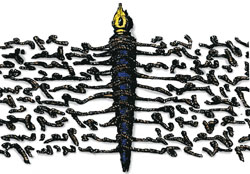 Kenya still doesn't have its new constitution 15 years after the process to write it began. The story has positive lessons and cautions for Nepal.
Kenya still doesn't have its new constitution 15 years after the process to write it began. The story has positive lessons and cautions for Nepal.
Kenya was a one-party dictatorship from 1982 to 1992, but in the late 1980s, Kenyans began a people's movement demanding reform and a return to constitutional democracy through a constituent assembly.
The government gave in and agreed to review the constitution. The process was participatory, and aimed at a constitution which respected human rights, multi-party democracy, and ethnic and gender equity.
First, an independent commission was set up in late 2000 to educate people about constitutions and to collect their views to form the basis of the draft constitution the constituent assembly would consider.
The 29-member commission was too large and the members were too often linked to political parties, but all were lawyers or people in public life.
The commission held meetings in every constituency, with interpreters for local languages and sign language. Thousands attended and the commission received 36,000 submissions, all were analysed. The results were freely available.
People spoke openly despite fear of retaliation. The urban poor and rural communities produced a more scathing critique of years of authoritarianism than any scholarly or NGO analysis, and this provided a secure basis for the reform agenda.
The draft constitution, while not perfect, was enthusiastically received. The constituent assembly (called the National Constitutional Conference) was to follow, though final approval depended on parliament on the insistence of the president, who controlled it.
The conference had 629 members, including all MPs, three elected members from each district, and another chosen by civil society groups. The chair ensured underrepresented groups and minorities had a voice.
Right before the first formal sitting in 2002, the president called an election. The assembly suspended work for five months. When they returned, politicians were making calculations of personal advantage.
But most conference delegates were committed and serious, and after 11 months of work it adopted a draft constitution which overall responded to the demands of the people. The size of the conference made rational discussion hard, some delegates demanded higher allowances, others were bribed by politicians, and many stopped coming. Tribalism, which barely figured in popular submissions, became prominent. There was constant political interference, and delaying tactics. The process caused elation and frustration.
Decisions were made by consensus, failing which an article had to be accepted by a two-thirds majority. MPs persuaded the conference to reject some ideas that made them and their parties accountable. Some ideas accepted enthusiastically were not workable, notably the provisions for devolution of power to districts.
The draft constitution adopted proposed a parliamentary system to replace the existing all-powerful presidential system. But president Mwai Kibaki and his henchmen, loathe to lose power, 'persuaded' parliament to endorse a very different draft, which was put to a referendum. It was overwhelmingly rejected. People voted against it because they preferred the earlier draft, or out of dissatisfaction with the government, or for tribal reasons.
Kenya doesn't have its constitution yet, but for Nepal, these conclusions stand out:
. Get people involved.
. Give them the facts.
. Speed it up.
. Protect the process through the interim constitution.
. Keep the CA small.
. Short term self-interest is disruptive.
. A referendum is expensive, unpredictable, and in multi-ethnic societies can upset a carefully-negotiated draft.
Yash Ghai was chair of the Kenya's constituent assembly, and is a UNDP Adviser in Nepal on constitution making. Jill Cottrell is a consultant on constitutional matters.


